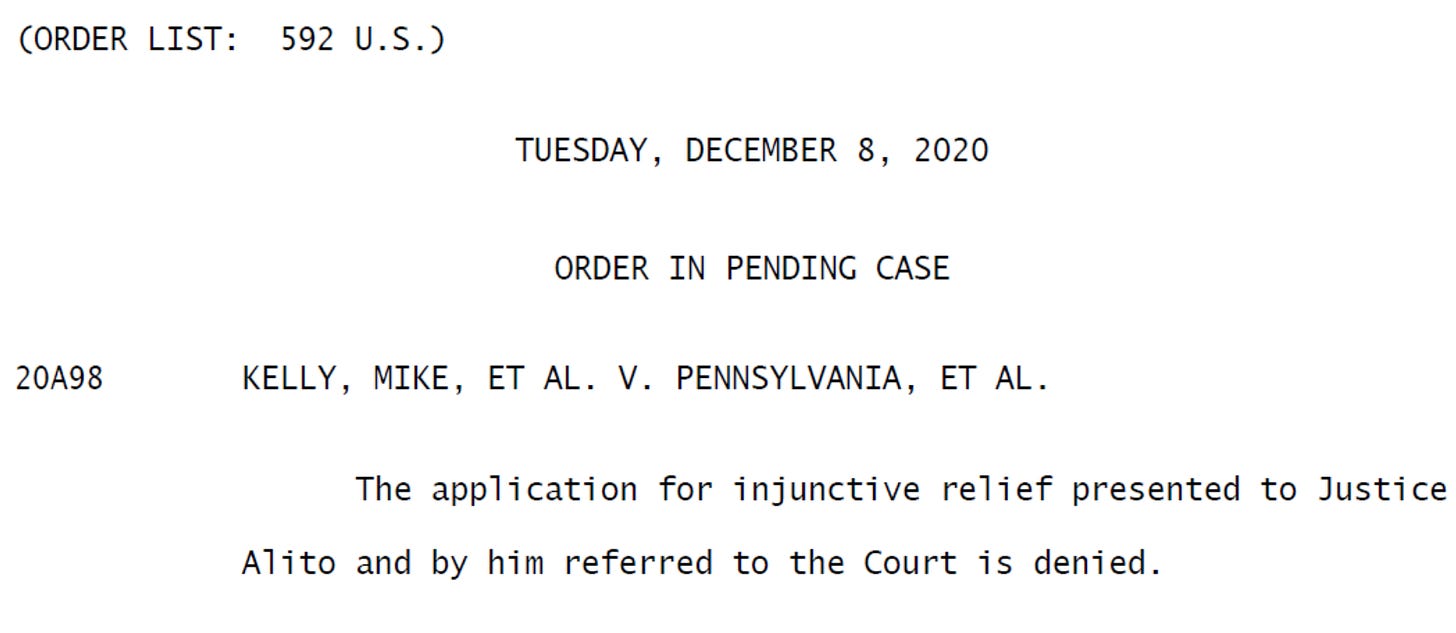Welcome to the Countdown Journal. There are five (5) days left until the Electoral College votes are cast; and 42 days until the Inauguration of Joe Biden.
Bear with me here, but maybe it’s just possible that Donald Trump doesn’t really understand how the Supreme Court works.
It’s also possible that he does not really grasp what conservative judges believe, and has no clue what concepts like “judicial restraint” actually mean.
And, I know this seems like a reach, but it may also be possible that Trump doesn’t really know the justices he personally put on the Court.
Hours before the one-sentence slap down, Trump retweeted this image of Justice Amy Coney Barrett.
Apparently, she has a different idea of her role.
Trump and many of his most fervid supporters seemed to imagine that the conservative justices on the High Court might be willing to use their authority to overturn the election results in Pennsylvania and award the state’s electoral votes to Trump. Just before the decision came down, Trump said, “Now let’s see whether or not somebody has the courage, whether it’s a legislator or legislatures or whether it’s a justice of the Supreme Court or a number of justices of the Supreme Court. Let’s see if they have the courage to do what everybody in this country knows is right.”
His use of the word “courage,” was interesting, because it suggested that at some level, he knew that this kind of judicial intervention required something more than merely applying the letter of the constitution.
The suggested remedy in the Pennsylvania case was to throw out every vote cast by mail in the election, “more than 2.5 million in total — or to dismiss the outcome of the election altogether so that the state legislature could appoint its own slate of presidential electors.”
Pennsylvania’s lawyers told the U.S. Supreme Court that was a shocking request-- “nothing less than an affront to constitutional democracy” that would ensnare the judiciary “in partisan strife.”
“Petitioners ask this court to undertake one of the most dramatic, disruptive invocations of judicial power in the history of the Republic,” Pennsylvania’s response said. “No court has ever issued an order nullifying a governor’s certification of presidential election results.”
It was, in short, delusional to imagine that the conservatives on the court would sign on to this anti-democratic clusterfuck.
But reality is the not the operative principle behind the continuing efforts to get the justices to nullify Biden’s win.
The latest Hail Mary is the Texas attorney general’s cartoonish attempt to get the court to overturn the elections in four other states — Georgia, Michigan, Pennsylvania, and Wisconsin. As Kim Wehle notes in today’s Bulwark, the suit “makes a slew of audacious factual allegations that are unestablished and untested. “ And it goes further than the Pennsylvania suit that the Court just squashed. The Texas case “is asking five unelected justices with jobs for life to cancel the millions of votes legitimately cast in four states, and tell the legislatures in those states to give the electors to Trump. (Even Ted Cruz only wants to wipe out all the votes from just one state.)”
How bad is the Texas case? This bad:
Like the 50 or so other failed cases brought by the legal wizards of TrumpWorld, this one is also going nowhere.
"The merits are so outrageous in these claims that even the most avid Trump judges on the federal bench are laughing them out of court," Rebecca Green, co-director of the election law program at William & Mary Law School told USA Today. "I don’t see any reason why his judges on the Supreme Court wouldn’t be forced into that same position.”
And yet, bizarrely, a handful of other states, including Alabama and Louisiana have joined the suit. And Georgia’s two GOP senators are also endorsing the move to wipe out their own state’s election.
Not surprisingly Trump wants his marks to think the Texas case actually has a shot, as he continues to rake in millions of dollars and undermines faith in our democratic elections.
We should remember all of their names. Make sure you read Christian Vanderbrouk’s fantastic piece in this morning’s Bulwark: ‘Enemies of Democracy.”
There is nothing magical about the U.S. Constitution. Unmoored from our founding principles, it can become an instrument of tyranny. For parts of our history—specifically for Americans of color—it was.
It is important, therefore, to keep score on who, exactly, democracy’s enemies are.
And then he names names. Read it. Save it.
Greg Sargent makes an important point. It doesn’t really matter what Republican voters say they believe, he writes.
What matters is that many of them are entirely willing to support specific concrete actions to steal the election on Trump’s behalf.
What Republican voters think, or say they think, about who really won matters less than the fact that, as a consequence, they actively want their elected representatives to subvert our democracy and keep Trump in power illegitimately.
This all has consequences, because it keeps false hope alive. It’s likely that charlatans like Ted Cruz understand that this is hopeless, but there are points to be scored, cash to be raised, and clicks to be had.
Unfortunately there are millions of folks in TrumpWorld who don’t know they are being conned. They still actually believe that Trump will win this thing. And, that’s dangerous, because many of them will be shocked when reality hits.
Meanwhile, the rhetoric continues to escalate.
The Arizona Republican Party has asked its followers if they are willing to die for the cause of overturning the presidential election results, eliciting alarm and criticism from within and outside the GOP.
The party's official Twitter account on Monday night shared a post from Ali Alexander, an activist with an organization called "Stop the Steal" that has protested election results.
"I am willing to give my life for this fight," Alexander wrote. When sharing his comment, the GOP asked followers: "He is. Are you?"
The party then posted a clip from the movie "Rambo", highlighting the quote: “This is what we do, who we are. Live for nothing, or die for something.”
But, but but… there is another side to this story. Just as there is a huge gap between what the MAGAverse is willing to say on Twitter and what they are willing to say in court, there is also a gap between the Trumpkins and the Republicans who have actual legal skin the game.
Aaron Blake notes that “it’s worth emphasizing that the vast majority of Republicans who have actually had to decide have gone against Trump.”
But just as notable as the lack of Republicans willing to say Biden is the president-elect is the lack of buy-in on Trump’s claims from other Republicans. They might soon have a choice to make if their colleagues press the issue, meaning they can’t keep their powder so dry forever. But pretty much everyone who has come before them from their own party and who has actually been forced to take a stand hasn’t sided with Trump.
And that’s significant — both when it comes to what they did (however forcefully they did it) and when it comes to Republicans from other states who would have to second-guess them to fall in line with Trump.
WASHINGTON — The House overwhelmingly passed a $741 billion defense policy bill on Tuesday that would require that Confederate names be stripped from American military bases, defying President Trump’s veto threat and moving lawmakers one step closer to a potential showdown in his final weeks in office.
The 335-78 bipartisan vote to approve the legislation that authorizes pay raises for American troops reflected optimism among lawmakers in both parties that Congress would be able to force the enactment of the bill over Mr. Trump’s objections, in what would be the first veto override of his presidency. The margin surpassed the two-thirds majority both the House and Senate would need to muster to do so.
Quick Hits
1. Pragmatists, Professionals, and Patriots on Biden’s National Security Team
John B. Bellinger III and David J. Kramer in today’s Bulwark:
Trump used to brag that we will get “tired of winning so much.” We are exhausted, but not from winning. The past four years have been a train wreck, and Trump has been the conductor. Biden has vowed that the next administration will emphasize American leadership together with revitalization of our alliances—and just as importantly, that it will return to decency, normalcy, compassion, and predictability, none of which we have seen over the past four years. Republicans should welcome that and so should the rest of the world.
2. Four Steps to Restore Global Democracy
Michael Abramowitz and Alex Thier write in today’s Bulwark:
The deterioration of democracy is not a new phenomenon. Freedom House has documented 14 consecutive years of decline. But the downward slide looks likely to continue in the wake of a pandemic that is prompting many governments to restrict human rights and trample democratic norms. Important stars in the democratic constellation are dimming—from Brazil and India to Poland and the Philippines, not to mention the United States itself. This follows the earlier reversal of hopeful transformations in places like Hungary, Turkey, Lebanon, and Kyrgyzstan.
Meanwhile, the leaders of the unfree world—in countries such as China, Russia, and Iran—are not only repressing their own people but also exploiting the openness of democratic societies, attacking them through disinformation, corruption, technological infiltration, and election interference. The weaker the international democratic order, the easier it is for these kleptocrats and dictators to abuse their citizens, steal resources, intimidate their neighbors, and escape accountability. It also means the United States will increasingly face regimes that do not share our fundamental values, many of whom, emboldened by the president’s attacks on democratic norms, pose an increasing security risk.
If there is a tipping point for global democracy, we may be nearing it.
Cheap Shots
Spoiler alert: the answer is Ted Cruz.
All the best people.
Deep Thoughts
‘This Must Be Your First’
Zeynep Tufekci in The Atlantic: “Acting as if Trump is trying to stage a coup is the best way to ensure he won’t.”
Much debate has ensued about what exactly to call whatever Trump is attempting right now, and about how worried we should be. It’s true, the whole thing seems ludicrous—the incoherent lawsuits, the late-night champagne given to official election canvassers in Trump hotels, the tweets riddled with grammatical errors and weird capitalization. Trump has been broadly acknowledged as “norm shattering” and some have argued that this is just more of his usual bluster, while others have pointed out terminological issues with calling his endeavors a coup. Coup may not quite capture what we’re witnessing in the United States right now, but there’s also a danger here: Punditry can tend to focus too much on decorum and terminology, like the overachieving students so many of us once were, conflating the ridiculous with the unserious. The incoherence and incompetence of the attempt do not change its nature, however, nor do those traits allow us to dismiss it or ignore it until it finally fails on account of that incompetence.







